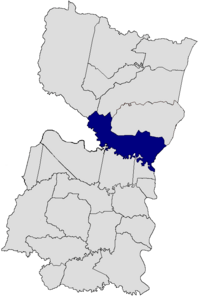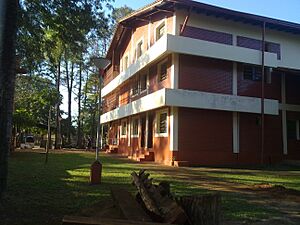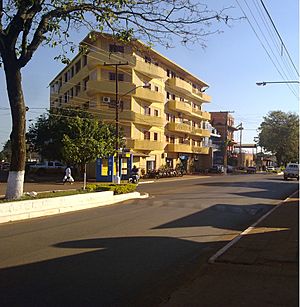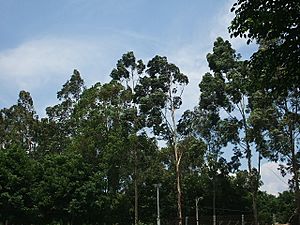Hernandarias, Paraguay facts for kids
Quick facts for kids
Hernandarias
Takuru Pucu
|
|||
|---|---|---|---|
|
District and City
|
|||
|
|||

Hernandarias in the Alto Paraná Department
|
|||
| Country | Paraguay | ||
| Department | Alto Paraná | ||
| Foundation | 7 July 1896 | ||
| Elevation | 243 m (797 ft) | ||
| Population
(2008)
|
|||
| • Total | 79,735 | ||
| Time zone | -4 Gmt | ||
| Postal code |
7220
|
||
| Area code(s) | (595) (631) | ||
Hernandarias is a city and district in the Alto Paraná Department of Paraguay. It's named after Hernando Arias de Saavedra, who was the first governor in South America born in the Americas. This city is famous for being very close to the huge Itaipu Dam.
Hernandarias is about 349 kilometers (217 miles) from Asunción, the capital city of Paraguay. It is known as the "Latin American Capital of Electric Power" because of its important hydroelectric plants. The city is also part of the larger area called Gran Ciudad del Este.
Contents
What's in a Name? The Etymology of Hernandarias
Hernandarias was once called "Tacurú Pucu." This name means "Long antplace" because of the many ant mounds found there. The city was later renamed to honor Hernando Arias de Saavedra. He was the first governor of the "Giant Indies" province who was born in the Americas during the colonial period.
Weather and Climate in Hernandarias
The average temperature in Hernandarias is around 21 °C (70 °F) each year. Temperatures can reach as high as 38 °C (100 °F) and drop to 0 °C (32 °F). The Alto Paraná Department gets the most rainfall in Paraguay. In winter, you can often see dew and fog. The city of Hernandarias is surrounded by the Acaray and Paraná Rivers.
Who Lives Here? The Demographics of Hernandarias
According to estimates from 2008, Hernandarias had 79,735 residents. Of these, 40,389 were males and 39,346 were females.
A Look Back: The History of Hernandarias
Hernandarias became a third-category municipality on July 26, 1988. It was then upgraded to a first-class municipality on March 22, 1990.
This area was once a major center for yerba mate production. There was a very large yerba factory called "Industrial Paraguaya." The construction of big dams in the region helped Hernandarias grow and develop a lot.
Powering the Region: The Economy of Hernandarias
Hernandarias is known as the "Latin American Capital of Electric Power." It has two major hydroelectric power plants. The Acaray plant started operating in 1968. The Itaipu Dam was built between 1976 and 1982. Itaipu is one of the largest dams in the world and is considered a modern wonder.
The area around Hernandarias is also important for farming. Farmers grow crops like palm, mint, maize (corn), coffee, cotton, rice, beans, wheat, and castor. People also work in hunting animals, forestry (managing forests), and trade.
Exploring Hernandarias: Tourist Attractions
The Itaipu and Acaray dams are popular places for tourists to visit. Many interesting sites in Hernandarias were created because of the Itaipu Dam's construction:
- Itabo Biological Reserve: This nature reserve is about 80 km (50 miles) from Hernandarias. It covers 13,807 hectares (about 34,118 acres) of hilly land. The Itabo River flows through the reserve. The climate here is subtropical with light rainfall. You can find many types of trees, like Tabebuia and Cedrela fissilis.
- Museum of the Earth Guarani: This is Paraguay's first interactive multimedia museum. It has two main parts. The "World Guarani" section teaches about the culture and life of the ancient Guarani people. It also shows how people lived here 10,000 years ago. The "World of Science" section displays animals that live in the area. The museum is located about 7 km (4.3 miles) from Ciudad del Este.
- Museum of Natural History: This museum displays samples of animals and plants from the local area.
- Itaipu Zoo: This zoo is home to many different animal species. It covers an area of 12 hectares (about 30 acres).
- Forest Nursery: This nursery grows many types of plants from the region. Each year, they produce almost 200,000 plants from over 500 different species. These include ornamental plants, fruit trees, and forest trees. The plants are used to replant areas that have lost trees and for landscaping.
- Aquaculture Station: This station raises different types of fish. It has labs, ponds, and hatcheries. Experts here work to create and share new technologies for fish farming. Some of the main fish species raised are pacú, karimbatá, gold, and surubí.
- Tatar Yupí Refuge: This refuge has recreational areas along the shores of Lake River and Tatar Yupí. Tourists can go on photographic safaris, guided tours, and boat rides.
- Municipal Theatre: The Hernandarias Municipal Theatre has been recently updated. It can hold almost a thousand people. Many artistic shows, like dance, theater, and choir performances, take place here.
- Walk Spain: This is a group of buildings that house the Culture, Tourism, and Education Departments of Hernandarias. It also includes the Library and Technology Park.
- Parana Country Club: This is an exclusive neighborhood. It offers many features that make it a great place to live.
Getting to Hernandarias
Hernandarias is located about 15 km (9 miles) from Ciudad del Este. To get there, you can take Route II "Mcal. Estigarribia" until the viaduct at the 4 km mark. From there, take the highway that leads to Saltos del Guairá.
See also
 In Spanish: Hernandarias (Paraguay) para niños
In Spanish: Hernandarias (Paraguay) para niños







